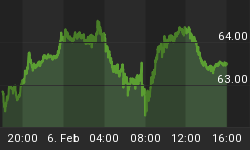According to various sources, Berkshire Hathaway lost $310 million in the first quarter of 2005 betting against the U.S. Dollar. This $310 million loss generated a plethora of headlines over the weekend about Warren Buffett's "failed" bet against the U.S. Dollar. Just by chance, we decided to click on the top news headline on yahoo.com and we were taken to a Reuters article titled "Berkshire Loses Currency Bet". At the bottom of most articles on the yahoo website, there are sponsored links from advertisers. One link that caught our attention was an advertisement from a currency trading website called fxcm.com. Your authors are not currency traders, and we have never heard of fxcm.com, but that is beside the point. What is important is that, for the first time in recent history, currency trading has gone mainstream.
For most of the 1990s, mom and pop investors learned how to surf the Internet. By the end of the decade, almost every major portal website such as AOL, Yahoo, or MSN had banner advertisements from sponsors such as Datek, E-trade, Ameritrade, Schwab and TD Waterhouse. Tens of millions of Americans would wake up every day and get bombarded with ads from various online brokers. You couldn't get a sports score or check a stock quote without seeing an ad for "free real time quotes" or "$8 online trading". Combine this new distribution phenomenon with a skyrocketing stock market, and Americans started trading online in droves.
As the NASDAQ imploded and the housing bubble took its place, links to E-trade & Schwab were replaced by advertisements for LendingTree.com & E-loan. By this time, nearly every American had a web connection at home or work. With interest rates coming down and FICO scores becoming as American as apple pie, online loans started to take off. All you needed to do was spend a few minutes typing in your personal information and thousands of dollars could be yours via a cash-out refinancing or home equity loan. This trend still continues today.
The Dollar decline over the last two years has become a topic to be discussed at cocktail parties. Ask someone if they have plans to travel to Europe and they will reply, "I wouldn't go there today because our Dollar is worthless." Just a few weeks ago, an image of a shrinking Dollar graced the cover of Newsweek. So it is only appropriate that mom & pop investors get the chance to take advantage of fluctuating currencies by entering the forex trading game. The advertisement for fxcm.com is just the first sign of this trend.
In addition to interest in foreign currencies, the weak Dollar has increased the popularity of online commodity trading accounts. You cannot go a day without seeing a Lind Waldock commercial on CNBC. Nor can you go a day without hearing about "peak oil". The public understands oil better than other commodities because everyone has to fill up their tank with gasoline. A weekly trip to the gas station and glancing at fuel prices is no different than a weekly glance at the business section to check stock prices. Take a look at the charts of most oil companies' stocks and you'll see that massive amounts of money have moved into energy over the past year.
This brings us to gold and silver. These two precious metals are commodities, but also have monetary value as well. Since biblical times, gold and silver have been used as money. Until the 1970s, the U.S. Dollar was literally as good as gold. When Richard Nixon declared that the Dollar would no longer be backed by gold, the Dollar price of gold skyrocketed to unimaginable levels. In fact, there was one point in time about 25 years ago that one could purchase the Dow Jones Industrial Average (currently at 10,000) for just one ounce of gold. Back then, any investor who wanted to buy gold either had to purchase coins, bars or futures contracts.
Since 2001, a new bull market in gold and silver has begun. While the price of gold has gone up almost 75% since then, the prices of most gold mining stocks have gone up four or five fold. Yet even with this great bull market taking place, those who want to purchase gold itself (rather than a mining company's stock) still face hurdles. Sure you could walk into a coin shop (most of these are extinct) or jewelry store and pay up for a few coins. And you could even buy shares in an exchange traded fund linked to the gold price. But as far as purchasing physical gold, there is no equivalent to E-loan or Ameritrade. When you visit Yahoo.com or MSN.com, you will not see an advertisement for buying gold coins. The only place we have ever seen ads for gold coins on a regular basis (not including financial sites) are on conservative websites such as newsmax.com. Once the public catches on to the gold bull market, expect to see advertisements for coins continue to pop up. As the gold price explodes, we expect to see online coin shops advertising on MSN.com or CNN. At that point, it may be a good time to sell.















